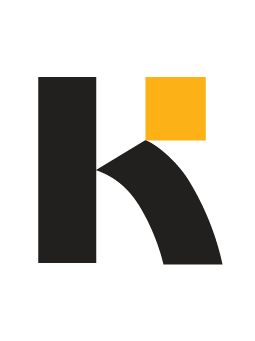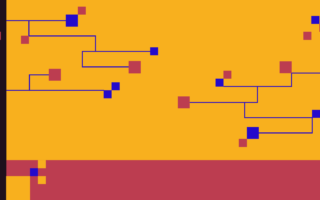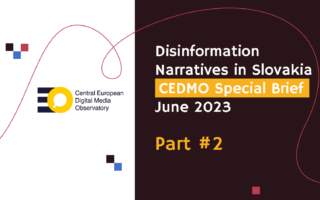What's
CEDMO is expanding the number of partners and the range of activities
Thirteen organizations from six European countries have joined forces to expand the international multidisciplinary consortium Central European Digital Media Observatory (CEDMO), which has been operating in the Central European region since October 2021 under the leadership of Charles University. An international team of fact-checkers, social science and technology researchers, investigative journalists working to verify publicly available information (OSINT), and media and media literacy experts will address the processes and implications of digital transformation, including the emergence of generative artificial intelligence.
The consortium aims to analyse and understand the impact of digital transformation on society. The activities include identifying, investigating and prioritising the main sources and causes of adverse information phenomena and disruptions in Central Europe (especially in Slovakia, the Czech Republic and Poland) in order to propose short and long-term measures and recommendations that will enable civil society, public institutions and the private sector to respond to the declining trust in key institutions and that will also help society to resist the increasing impact of false and distorted information.
You can find more information about the ongoing CEDMO 2.0 project here.
CEDMO expands its ranks
The existing eight organisations of the consortium will be joined by five more. Among the academic partners leading the main consortium activities, Charles University will continue to act as the coordinator of the entire project, along with the Slovak Kempelen Institute of Intelligent Technologies, which leads activities involving the use of artificial intelligence in combating disinformation, and the Polish Uniwersytet SWPS, which will focus on analyzing disinformation campaigns and their impact on society, democracy, and the economy.
The consortium’s media literacy activities, strategy and communication will be primarily the responsibility of the Polish research institute NASK, the international think tank GLOBSEC and the Slovak communication agency Seesame.
“Central European countries, and Slovakia in particular, are characterized by a significant susceptibility to disinformation and a low resistance to manipulative narratives, as confirmed by our research. At the Center for Democracy and Resilience, we have extensive expertise on the impact of disinformation and the harmful influence of non-democratic countries on our society and we use this knowledge to design strategies to minimize their negative impact. We will primarily leverage our expertise to build the resilience of the public sector against disinformation and hybrid threats. In addition, we will participate in the meetings of the European Digital Media Observatory and represent CEDMO in the meetings of the working groups for the EU Code of Practice on disinformation,” says Dominika Hajdu, Director of the Centre for Democracy and Resilience at GLOBSEC.
“The prevalence of disinformation hinders progress for the well-being of individuals and society, questions the latest scientific knowledge and fosters a culture of skepticism and mistrust. A special area of concern is medicine. Disinformation and hoaxes about medical treatments, vaccinations and diseases are particularly dangerous and can pose health risks. At Seesame, we have been intensively engaged in a wide range of projects to combat disinformation for several years. Within CEDMO, we will focus on campaigns and education in media literacy and critical thinking, particularly targeting vulnerable groups such as the elderly and parents of young children. As communication consultants with extensive experience in reputation management, we will also be responsible for the consortium’s strategic communication,” explains Michaela Benedigová, Director and Partner at Seesame.
Fact-checking will be provided by the French agency Agence France-Presse (AFP), the Czech Demagog.cz, the Polish Demagog.pl and the Slovak Demagog.sk. “Demagog.sk has been verifying the statements of politicians and other publicly active individuals made in political discussions, media and on social networks for fourteen years. We also strive to alert the public to circulating hoaxes and scams on various topics, from health to history. In recent years, we have expanded our activities to include media literacy and critical thinking workshops for high school students, teachers, and seniors. Hence, in addition to fact-checking, we will also work on campaigns focused on media literacy,” explains Veronika Frankovská, Project Manager and Chief Analyst of the Demagog.sk portal.
The independent collective of researchers, investigators, and citizen journalists from Bellingcat (based in the Netherlands) will join them and will be responsible for verifying information from publicly available sources (OSINT).
Artificial intelligence also helps fact-checkers
The use of artificial intelligence to streamline the work of fact-checkers will be explored and tools developed by two academic institutions: the Czech Technical University in Prague (ČVUT) and the Slovak Kempelen Institute of Intelligent Technologies (KInIT). The technological aspects of fact-checking, including the web, will be managed by the Athens Technology Center (ATC) from Greece. “Generating content is easier in today’s age of artificial intelligence than evaluating its credibility or uncovering unfair recommendations on social media. Within the CEDMO project, we at KinIT will research and develop solutions that use artificial intelligence to identify, create, and disseminate trustworthy information, especially in text form. In designing methods, we will use extensive language models and specialized datasets,” says Mária Bieliková, founder of the KInIT research institute.
Already in the first stage of the CEDMO project, researchers from KInIT and ČVUT managed to develop four artificial intelligence tools to support fact-checking, which are useful in several phases of the work of fact-checkers and journalists. These tools will be further developed. The first tool allows fact-checkers to identify which social media posts are worth closer scrutiny more effectively. The second can extract specific claims from verified texts. The third tool helps eliminate duplicate verification of the same report by multiple fact-checkers to avoid wasting capacity. The fourth tool can search for articles that contain factual information to verify a specific claim.
CEDMO cooperates and coordinates with the European Digital Media Observatory (EDMO) and its regional hubs across the EU. The Hub’s activities are supported by funding from the European Commission.


